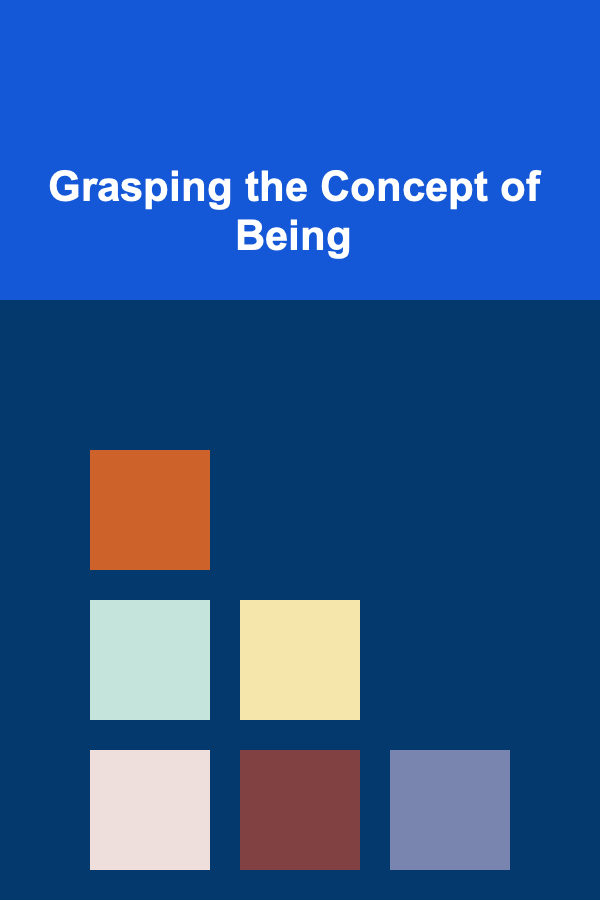
Grasping the Concept of Being
ebook include PDF & Audio bundle (Micro Guide)
$12.99$10.99
Limited Time Offer! Order within the next:

The concept of "being" is one of the most fundamental and enduring questions in philosophy, spanning millennia and cutting across diverse philosophical traditions. It is a concept that, while seemingly simple, quickly reveals itself to be deeply complex and multifaceted, demanding careful consideration of its various layers and implications. This essay will explore the various approaches to understanding the concept of being, examining its historical development, its different interpretations, and the challenges and insights it presents.
The Elusive Nature of Being
Why is "being" so difficult to grasp? Part of the difficulty stems from its very generality. Being, in its most basic sense, refers to the fact of existence -- that something is. However, this "is" can take on a vast range of meanings depending on the context. We can speak of the being of a physical object, the being of a concept, the being of a person, or even the being of a fictional character. Each of these instances of "being" carries its own nuances and implications, making it challenging to arrive at a unified and comprehensive understanding.
Furthermore, the concept of being is intimately linked to other fundamental concepts, such as identity, existence, essence, and reality. Trying to isolate "being" from these related concepts is like trying to separate a color from the spectrum -- it loses its meaning and becomes impossible to define precisely. Therefore, grasping the concept of being requires a holistic approach that takes into account its interconnectedness with other key philosophical concepts.
Historical Perspectives on Being
The philosophical inquiry into being has a rich and varied history. Here are some key historical perspectives:
Ancient Greece: The Foundation of Ontology
The ancient Greeks laid the groundwork for the study of being, which would later become known as ontology (from the Greek words "onto" meaning "being" and "logos" meaning "study" or "reason"). Pre-Socratic philosophers such as Parmenides and Heraclitus grappled with the nature of reality and the question of what truly exists.
- Parmenides: Parmenides famously argued that "being is" and "non-being is not." This seemingly simple statement has profound implications. Parmenides believed that true reality is unchanging, eternal, and indivisible. Change and motion, which are readily apparent in the world around us, are merely illusions, according to Parmenides. His emphasis on the unchanging nature of being had a significant influence on subsequent philosophers.
- Heraclitus: In contrast to Parmenides, Heraclitus emphasized the constant flux and change in the world. He famously said, "You cannot step twice into the same river," highlighting the ever-changing nature of reality. Heraclitus believed that change itself is a fundamental aspect of being. His ideas foreshadowed later philosophical developments that emphasized the dynamic and process-oriented nature of reality.
- Plato: Plato, a student of Socrates, developed a theory of Forms, which are perfect and eternal archetypes of the objects and concepts we encounter in the world. These Forms, such as the Form of Beauty or the Form of Justice, are more real than the physical objects that are merely imperfect copies of them. For Plato, true being resides in the realm of the Forms, and our understanding of the world is based on our ability to access and contemplate these Forms.
- Aristotle: Aristotle, a student of Plato, took a more empirical approach to the study of being. He developed a system of categories that classify different kinds of being, and he emphasized the importance of studying individual substances and their properties. Aristotle's concept of "substance" is central to his ontology. A substance is an individual entity that possesses a particular essence or nature. Aristotle also introduced the concepts of potentiality and actuality, which describe the way in which a substance can change and develop over time.
Medieval Philosophy: Being and God
During the medieval period, philosophical inquiry was heavily influenced by religious thought. Medieval philosophers sought to reconcile Greek philosophy with Christian theology, and the concept of being played a central role in these efforts.
- Augustine: Augustine, a prominent Christian philosopher, drew heavily on Plato's philosophy in his exploration of being. He saw God as the ultimate source of all being, and he argued that our knowledge of God is essential for understanding the nature of reality. Augustine explored the problem of evil, arguing that evil is not a substance but rather a privation or lack of being.
- Thomas Aquinas: Thomas Aquinas, a towering figure in medieval philosophy, integrated Aristotelian philosophy with Christian theology. He developed a complex system of metaphysics that distinguished between essence and existence. Aquinas argued that God is the only being whose essence includes existence, while all other beings have an essence that is distinct from their existence. This distinction is crucial for Aquinas's arguments for the existence of God.
Modern Philosophy: Subjectivity and Existence
The modern period witnessed a shift in focus from objective reality to subjective experience. Philosophers began to emphasize the role of the individual subject in shaping our understanding of being.
- René Descartes: Descartes's famous statement "Cogito, ergo sum" ("I think, therefore I am") marked a turning point in the history of philosophy. Descartes argued that the existence of the self is the only thing that can be known with absolute certainty. His emphasis on the thinking subject had a profound influence on subsequent philosophers.
- Immanuel Kant: Kant distinguished between the "noumenal" realm of things-in-themselves and the "phenomenal" realm of appearances. He argued that we can only know the world as it appears to us, filtered through the categories of our understanding. Kant's transcendental idealism challenged the traditional view that we can have direct access to objective reality.
- G.W.F. Hegel: Hegel developed a dialectical philosophy that emphasized the historical development of consciousness. He argued that being is not static but rather constantly evolving through a process of thesis, antithesis, and synthesis. Hegel's concept of the "Absolute Idea" represents the culmination of this process, a state of complete self-consciousness and understanding.
20th Century Philosophy: Existentialism and Beyond
The 20th century saw the emergence of new philosophical movements that challenged traditional notions of being. Existentialism, in particular, focused on the experience of individual existence and the meaning of being in a seemingly absurd world.
- Martin Heidegger: Heidegger's magnum opus, "Being and Time," is a seminal work in 20th-century philosophy. Heidegger sought to re-examine the question of being, arguing that it had been neglected by Western metaphysics. He introduced the concept of "Dasein," which refers to human existence as being-in-the-world. Dasein is characterized by its awareness of its own finitude and its responsibility for its own being. Heidegger distinguished between "ontic" and "ontological" understanding, with the latter involving a deeper questioning of the nature of being itself.
- Jean-Paul Sartre: Sartre, a leading figure in existentialism, emphasized the freedom and responsibility of the individual. He argued that "existence precedes essence," meaning that we are born into the world without a pre-defined purpose or nature. We are free to create our own essence through our choices and actions. Sartre explored the themes of anxiety, alienation, and the search for meaning in a seemingly meaningless world.
- Post-Structuralism: Philosophers like Jacques Derrida challenged the idea of fixed meanings and stable identities. Derrida's concept of "deconstruction" involves dismantling traditional philosophical concepts and exposing their inherent contradictions and limitations. He questioned the very possibility of arriving at a definitive understanding of being.
Different Interpretations of Being
Given the historical overview, it becomes clear that "being" is not a monolithic concept. Different philosophical schools and individual thinkers have offered diverse interpretations of what it means for something to be.
Being as Existence
This is perhaps the most basic understanding of being: to exist is to be. A chair exists, therefore it has being. A thought exists, therefore it has being. However, even this seemingly straightforward interpretation raises questions. Does the existence of a chair have the same kind of being as the existence of a thought? What about the existence of a fictional character? This interpretation highlights the challenges of applying the concept of being to different kinds of entities.
Being as Essence
This interpretation focuses on the inherent nature or essence of a thing. To be a chair is to possess certain essential characteristics, such as having a seat, a back, and legs. This interpretation is closely linked to Aristotle's concept of substance. The essence of a thing determines what it is and distinguishes it from other things. However, this interpretation raises questions about whether essences are fixed and unchanging, or whether they can evolve over time. It also raises questions about how we can know the essence of a thing.
Being as Reality
This interpretation equates being with reality. To be is to be real. However, this interpretation raises the question of what constitutes reality. Is reality limited to the physical world, or does it include other realms, such as the mental realm or the spiritual realm? Different philosophical schools offer different answers to this question. Materialists believe that reality is ultimately reducible to matter and energy, while idealists believe that reality is fundamentally mental or spiritual.
Being as Becoming
This interpretation, championed by philosophers like Heraclitus and Hegel, emphasizes the dynamic and ever-changing nature of being. To be is to become. This interpretation rejects the idea that being is static or fixed. Instead, it views being as a process of constant transformation. This interpretation is particularly relevant to understanding living organisms, which are constantly growing, developing, and adapting to their environment.
Being as Relation
This interpretation emphasizes the interconnectedness of all things. To be is to be related to other things. Nothing exists in isolation. Everything is part of a larger network of relationships. This interpretation is particularly relevant to understanding social and ecological systems, where the relationships between individuals and entities are crucial for their survival and well-being. This view resonates with systems thinking and ecological perspectives that see the world as an interconnected web of life.
Challenges and Insights
The exploration of being presents numerous challenges, but it also offers valuable insights into the nature of reality and our place within it.
The Challenge of Language
Language can be a powerful tool for understanding the world, but it can also be a source of confusion. The word "being" itself is a linguistic construct, and its meaning can vary depending on the context in which it is used. Philosophers have long struggled with the limitations of language in expressing the fundamental nature of being. Some philosophers, like Wittgenstein, have even argued that the concept of being is ultimately meaningless because it cannot be expressed in a meaningful way through language. This points to the inherent difficulty of capturing the essence of something so fundamental with the tools of human communication.
The Challenge of Subjectivity
Our understanding of being is inevitably shaped by our own subjective experiences and perspectives. We can never escape our own individual biases and limitations. This raises the question of whether it is possible to arrive at an objective understanding of being, or whether all understanding is ultimately subjective. Recognizing the role of subjectivity is crucial for avoiding dogmatism and for appreciating the diversity of perspectives on being.
The Insight of Interconnectedness
Despite the challenges, the exploration of being can lead to profound insights. One of the most important insights is the recognition of the interconnectedness of all things. Everything is related to everything else. We are all part of a larger whole. This insight can lead to a deeper sense of empathy, compassion, and responsibility towards others and towards the planet.
The Insight of Temporality
Another important insight is the recognition of the temporal nature of being. Being is not static or fixed, but rather constantly evolving and changing. This insight can help us to appreciate the beauty and fragility of life, and to live more fully in the present moment.
The Importance of Questioning
Ultimately, grasping the concept of being is not about arriving at a definitive answer, but rather about engaging in a continuous process of questioning and exploration. The more we question, the more we learn, and the closer we come to a deeper understanding of ourselves and the world around us. The very act of grappling with the question of being can be transformative, opening up new perspectives and challenging our assumptions about the nature of reality.
Conclusion
The concept of being is a complex and multifaceted concept that has occupied philosophers for centuries. While there is no easy answer to the question of what it means for something to be, the exploration of this concept can lead to valuable insights into the nature of reality and our place within it. By examining historical perspectives, different interpretations, and the challenges and insights associated with the concept of being, we can begin to develop a more nuanced and comprehensive understanding of this fundamental philosophical question. The journey of understanding being is a lifelong pursuit, and the rewards are a deeper appreciation of the world and our place within it.

How to Create a Minimalist Entryway for a Welcoming Home
Read More
How to Manage Short-Term Rental Properties Like Airbnbs Successfully
Read More
How to Use Modular Furniture to Save Space in Any Room
Read More
Quality Assurance Tester's Handbook: Tools, Techniques, and Best Practices
Read More
How To Get Rid of Milia Around Your Eyes
Read More
How to Pack for a Ski Trip: The Ultimate Checklist
Read MoreOther Products

How to Create a Minimalist Entryway for a Welcoming Home
Read More
How to Manage Short-Term Rental Properties Like Airbnbs Successfully
Read More
How to Use Modular Furniture to Save Space in Any Room
Read More
Quality Assurance Tester's Handbook: Tools, Techniques, and Best Practices
Read More
How To Get Rid of Milia Around Your Eyes
Read More